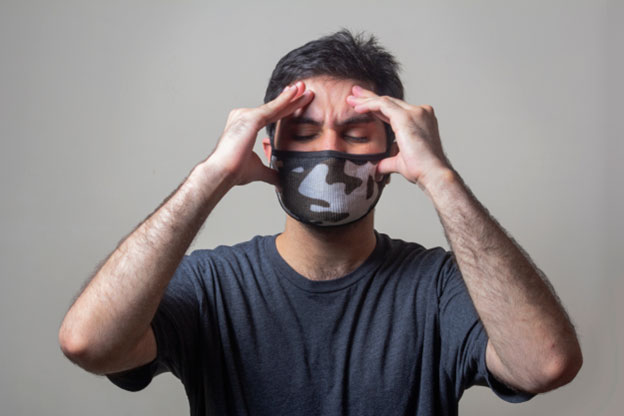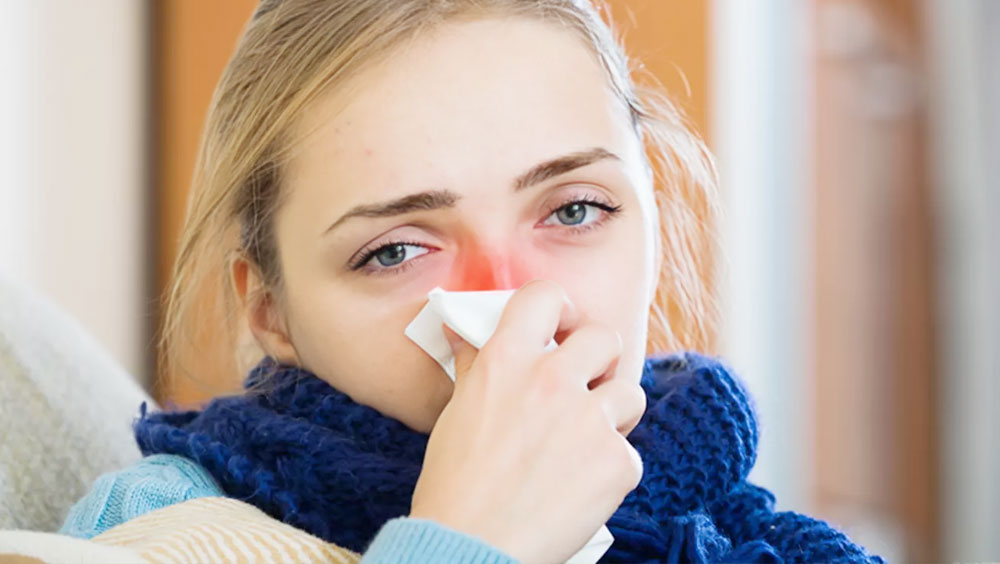If you suffer from a stuffy or congested nose, getting a good night’s sleep can seem like an impossible task. Trying to get comfortable and fall asleep while your nose is blocked up can be incredibly frustrating, leaving you feeling exhausted the next day. Thankfully, there are a few simple steps you can take to make sleeping with a stuffy nose easier.

Understanding Stuffy Nose and Its Causes
A stuffy nose, also known as nasal congestion, can be an annoying and bothersome condition that affects your ability to breathe comfortably. Whether it is due to seasonal allergies, a common cold, or a sinus infection, a stuffed-up nose can disrupt your sleep and make it difficult to get the restful sleep you need.
What Causes a Stuffy Nose?
A stuffy nose, or nasal congestion, can be caused by various factors. One common cause is allergies, which can be triggered by pollen, dust mites, or mold. When these allergens enter the nasal passages, they can cause inflammation and congestion, making it difficult to breathe through the nose.
Another common cause of a stuffy nose is a common cold. The cold virus or respiratory infection can lead to inflammation in the nasal passages, causing them to become congested. Along with a stuffy nose, cold symptoms include a runny nose, sore throat, and cough, which can all disrupt sleep.
Sinusitis, or a sinus infection, is another culprit behind nasal congestion. When the nasal cavities become infected and inflamed, they can block the nasal passages, leading to congestion and discomfort. Sinusitis can also cause other symptoms like facial pain and pressure.
The Importance of Sleeping Well with a Stuffy Nose
Getting a good night's sleep is essential for overall health and well-being. It plays a crucial role in supporting immune function, boosting cognitive performance, and allowing the body to recover and repair. However, a stuffy nose can significantly disrupt sleep and leave you feeling tired and groggy during the day.
Nasal congestion, whether due to allergies, a cold, or a sinus infection, can make it difficult to breathe comfortably when lying down. This can result in interrupted sleep, frequent awakenings, and a decreased quality of sleep overall. The discomfort caused by a stuffy nose can also lead to tossing and turning throughout the night, further impacting sleep patterns.
The lack of restful sleep caused by a stuffy nose can have several negative effects on your health. Daytime fatigue, difficulty concentrating, and decreased productivity are just a few examples. It can also weaken the immune system, making it harder to fight off infections and prolonging the recovery process.
Strategies for Sleeping with a Stuffy Nose
Sleeping with a stuffy nose can be a frustrating experience. The congestion can make it difficult to breathe, leading to a restless night of tossing and turning. However, there are several strategies you can try to help you sleep better and alleviate the discomfort caused by a stuffy nose.
Nasal Decongestion Techniques
First, try using saline nasal sprays or nasal irrigation. These solutions, made with a mixture of salt and water, can help keep nasal passages moist and thin out mucus, making it easier to drain. Simply follow the instructions on the package or use a Neti pot to rinse your sinuses gently.
Steam inhalation is another great way to clear your nasal passages. Take a hot shower or create a steam bath by filling a bowl with hot water and leaning over it with a towel draped over your head. Inhale the steam deeply for a few minutes to help loosen mucus and relieve congestion.

Elevating Your Head and Sleep Position
One effective way to sleep with a stuffy nose is by elevating your head while sleeping. By keeping your head slightly elevated, you can help alleviate nasal congestion and promote better airflow.
To achieve this sleeping position, you can use additional pillows or an adjustable bed. Place an extra pillow or two under your head to create a slight incline, allowing your nasal passages to stay open. Alternatively, if you have an adjustable bed, raise the head section to a comfortable angle.
Elevating your head while sleeping can help gravity drain mucus from your nasal cavities, reducing congestion and improving your ability to breathe. It can also help alleviate other related symptoms such as postnasal drip, sore throat, and sinus pain.
Humidification and Air Quality
One effective way to sleep with a stuffy nose is to use a humidifier or vaporizer in your bedroom. These devices add moisture to the air, which can help alleviate nasal congestion and keep your nasal passages moisturized throughout the night.
When the air is dry, it can trigger nasal irritation and exacerbate your stuffy nose. A humidifier or vaporizer helps combat this by releasing water vapor into the air, increasing humidity levels, and reducing nasal discomfort.
In addition to humidification, it's important to maintain a clean and allergen-free sleep environment. Dust mites, pet dander, and other allergens can worsen your stuffy nose and make it difficult to sleep. Regularly clean your bedroom, including vacuuming carpets, dusting surfaces, and washing bedding in hot water to eliminate these irritants.
Improving air quality can also reduce nasal congestion. Avoid smoking or exposure to secondhand smoke, as it can irritate your nasal passages. If you have allergies, consider using hypoallergenic bedding, dust mite covers, and air purifiers to filter out allergens.
Over-the-Counter Remedies and Natural Supplements
When dealing with a stuffy nose, there are several over-the-counter remedies and natural supplements that may help alleviate nasal congestion and promote a better night's sleep.

Nasal strips, also known as nasal dilators, are adhesive strips worn on the outside of the nose to open up the nasal passages. These strips work by gently lifting the nostrils, improving airflow, and reducing nasal congestion. They can be a great option for temporary relief and can often be found at your local pharmacy.
In addition to nasal strips, there are also over-the-counter nasal decongestant sprays available. These sprays work by constricting blood vessels in the nasal passages, reducing inflammation, and providing immediate relief from congestion. However, it is important to use these sprays sparingly and for short-term use only, as excessive use can lead to a rebound effect and worsen congestion.
When considering natural supplements, there are a few options that may help alleviate nasal congestion. Nasal saline sprays or rinses can help hydrate and cleanse the nasal passages, reducing inflammation and promoting better airflow. Neti pots, which use a mixture of warm water and salt, can also be used to flush out mucus and relieve nasal congestion.
Before using any medication or natural supplement, it is important to consult with a healthcare professional, especially if you have any underlying medical conditions or are taking other medications. They can provide guidance on the most suitable options for your specific situation.
Remember, restful sleep is crucial for your overall well-being, so finding the right remedies and techniques to alleviate your stuffy nose can greatly improve sleep quality.
Conclusion
In conclusion, finding relief for stuffy noses is vital for promoting better sleep and overall well-being. Nasal strips, nasal decongestant sprays, and natural supplements such as nasal saline sprays and neti pots can provide temporary relief by opening up the nasal passages and reducing congestion. However, it is important to use these options sparingly and for short-term use only, as excessive use can lead to rebound congestion.
If nasal congestion persists or becomes severe, it is advisable to consult a healthcare professional. They can provide guidance on the most suitable options for your specific situation, especially if you have underlying medical conditions or are taking other medications. Remember, restful sleep is essential for optimal health, so addressing nasal congestion will not only improve your sleep quality but also contribute to your overall well-being.

Frequently Asked Questions:
Can allergies cause a stuffy nose at night?
Yes, seasonal allergies can lead to nasal congestion, making it difficult to breathe while sleeping. Allergens like pollen, dust mites, or pet dander can irritate the nasal passages, causing them to become swollen and resulting in a stuffy nose.
Is it safe to use nasal decongestant sprays for an extended period?
Nasal decongestant sprays can provide temporary relief, but prolonged or excessive use can lead to a condition called rhinitis medicamentosa. This occurs when the nasal passages become dependent on the spray for congestion relief. It is best to consult a healthcare professional for guidance on long-term usage.
What can I do to prevent nasal congestion before bedtime?
To alleviate nasal congestion before sleep, try the following tips:
- Keep the air in your bedroom moist with a humidifier
- Use nasal strips to open up the nasal passages
- Stay hydrated by drinking plenty of water throughout the day
- Avoid irritants like smoke, strong odors, or allergens
- Elevate your head slightly during sleep to improve airflow
Are there any natural or home remedies for a stuffy nose?
Several natural remedies can provide relief from nasal congestion, including:
- Using a neti pot or saline nasal spray to rinse the nasal passages
- Inhaling steam from a hot shower or bowl of hot water
- Adding a few drops of eucalyptus oil to steam or warm water and breathing in the vapor
- Keeping the bedroom clean to minimize exposure to allergens like dust mites
- Consuming warm liquids like herbal teas or soups to help thin mucus
When should I see a doctor for a stuffy nose that affects my sleep?
If your stuffy nose is persistent or accompanied by other symptoms like severe facial pain, high fever, or difficulty breathing, it is recommended to consult a healthcare professional. They can determine the underlying cause of your nasal congestion and provide appropriate treatment options to improve your sleep quality.


